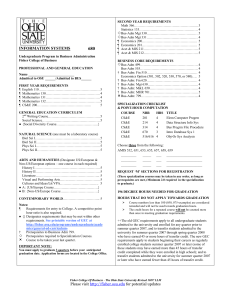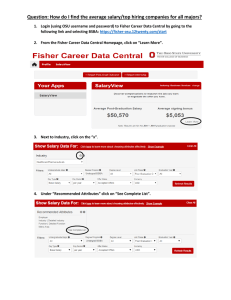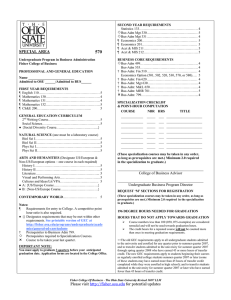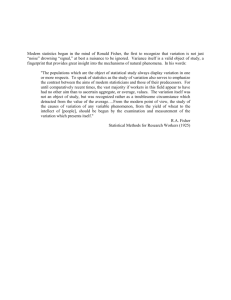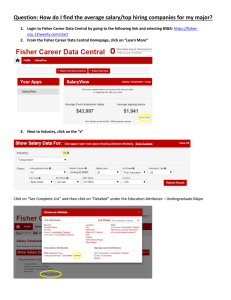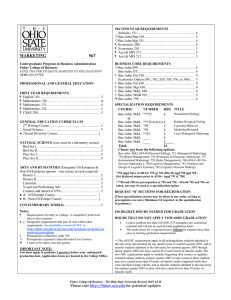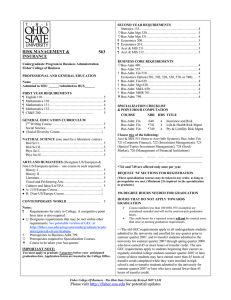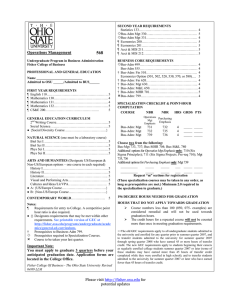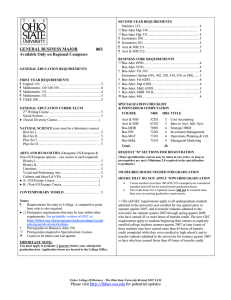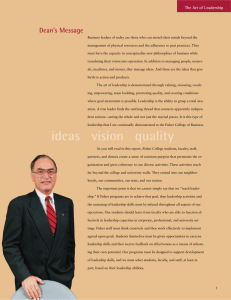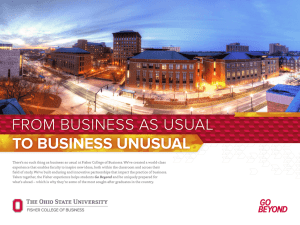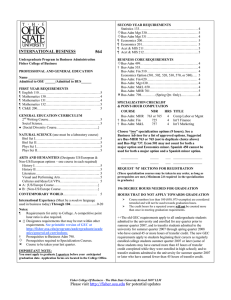Document 10971555
advertisement
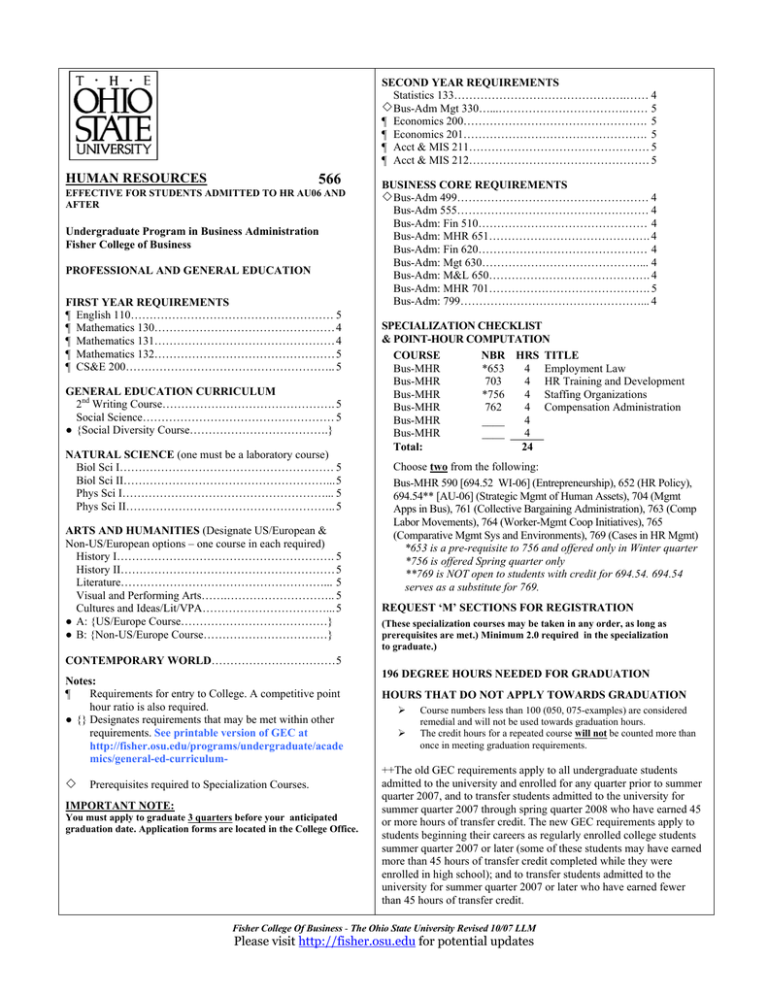
SECOND YEAR REQUIREMENTS
Statistics 133……………………………………….…… 4
Bus-Adm Mgt 330…...…………………………….…… 5
¶ Economics 200…………………………………………. 5
¶ Economics 201…………………………………………. 5
¶ Acct & MIS 211………………………………………… 5
¶ Acct & MIS 212………………………………………… 5
HUMAN RESOURCES
566
EFFECTIVE FOR STUDENTS ADMITTED TO HR AU06 AND
AFTER
Undergraduate Program in Business Administration
Fisher College of Business
PROFESSIONAL AND GENERAL EDUCATION
FIRST YEAR REQUIREMENTS
¶ English 110……………………………………………… 5
¶ Mathematics 130…………………………………………4
¶ Mathematics 131…………………………………………4
¶ Mathematics 132…………………………………………5
¶ CS&E 200……………………………………………….. 5
GENERAL EDUCATION CURRICULUM
2nd Writing Course………………………………………. 5
Social Science…………………………………………… 5
● {Social Diversity Course……………………………….}
NATURAL SCIENCE (one must be a laboratory course)
Biol Sci I………………………………………………… 5
Biol Sci II………………………………………………...5
Phys Sci I………………………………………………... 5
Phys Sci II……………………………………………….. 5
ARTS AND HUMANITIES (Designate US/European &
Non-US/European options – one course in each required)
History I…………………………………………………. 5
History II…………………………………………………5
Literature………………………………………………... 5
Visual and Performing Arts…….……………………….. 5
Cultures and Ideas/Lit/VPA……………………………...5
● A: {US/Europe Course…………………………………}
● B: {Non-US/Europe Course……………………………}
BUSINESS CORE REQUIREMENTS
Bus-Adm 499…………………………………………… 4
Bus-Adm 555…………………………………………… 4
Bus-Adm: Fin 510……………………………………… 4
Bus-Adm: MHR 651……………………………………. 4
Bus-Adm: Fin 620……………………………………… 4
Bus-Adm: Mgt 630……………………………………... 4
Bus-Adm: M&L 650……………………………………. 4
Bus-Adm: MHR 701……………………………………. 5
Bus-Adm: 799…………………………………………... 4
SPECIALIZATION CHECKLIST
& POINT-HOUR COMPUTATION
COURSE
NBR HRS TITLE
Bus-MHR
*653
4 Employment Law
Bus-MHR
703
4 HR Training and Development
Bus-MHR
*756
4 Staffing Organizations
Bus-MHR
762
4 Compensation Administration
Bus-MHR
____
4
Bus-MHR
____
4
Total:
24
Choose two from the following:
Bus-MHR 590 [694.52 WI-06] (Entrepreneurship), 652 (HR Policy),
694.54** [AU-06] (Strategic Mgmt of Human Assets), 704 (Mgmt
Apps in Bus), 761 (Collective Bargaining Administration), 763 (Comp
Labor Movements), 764 (Worker-Mgmt Coop Initiatives), 765
(Comparative Mgmt Sys and Environments), 769 (Cases in HR Mgmt)
*653 is a pre-requisite to 756 and offered only in Winter quarter
*756 is offered Spring quarter only
**769 is NOT open to students with credit for 694.54. 694.54
serves as a substitute for 769.
REQUEST ‘M’ SECTIONS FOR REGISTRATION
(These specialization courses may be taken in any order, as long as
prerequisites are met.) Minimum 2.0 required in the specialization
to graduate.)
CONTEMPORARY WORLD……………………………5
Notes:
¶
Requirements for entry to College. A competitive point
hour ratio is also required.
● {} Designates requirements that may be met within other
requirements. See printable version of GEC at
http://fisher.osu.edu/programs/undergraduate/acade
mics/general-ed-curriculum
Prerequisites required to Specialization Courses.
IMPORTANT NOTE:
You must apply to graduate 3 quarters before your anticipated
graduation date. Application forms are located in the College Office.
196 DEGREE HOURS NEEDED FOR GRADUATION
HOURS THAT DO NOT APPLY TOWARDS GRADUATION
¾
¾
Course numbers less than 100 (050, 075-examples) are considered
remedial and will not be used towards graduation hours.
The credit hours for a repeated course will not be counted more than
once in meeting graduation requirements.
++The old GEC requirements apply to all undergraduate students
admitted to the university and enrolled for any quarter prior to summer
quarter 2007, and to transfer students admitted to the university for
summer quarter 2007 through spring quarter 2008 who have earned 45
or more hours of transfer credit. The new GEC requirements apply to
students beginning their careers as regularly enrolled college students
summer quarter 2007 or later (some of these students may have earned
more than 45 hours of transfer credit completed while they were
enrolled in high school); and to transfer students admitted to the
university for summer quarter 2007 or later who have earned fewer
than 45 hours of transfer credit.
Fisher College Of Business - The Ohio State University Revised 10/07 LLM
Please visit http://fisher.osu.edu for potential updates
HUMAN RESOURCES
Human resources (HR) is a critical organization function. Organizations rely on employees as resources similar to
other resources such as facilities, equipment and brands. HR professionals are responsible for facilitating the effective
utilization of an organization’s workforce. They are valued for their knowledge of leadership, team-building and
motivation, and they must be capable of applying this knowledge in their own work and passing this knowledge on
to managers in other functions. HR professionals evaluate labor needs in conjunction with organization strategic goals
and future productivity, recruit talented individuals to enhance an organization’s workforce, interview and test job
applicants, understand job requirements and analyze employee capability, train employees, counsel employees
concerning personal or job-related issues, write policies, develop employee compensation programs, facilitate employee
career development, and ensure that an organization manages its workforce in keeping with legal guidelines. HR
professionals are most effective when they understand how an organization works and can apply that general business
knowledge in the context of HR decision-making.
OUTLOOK: Top executives realize the importance of HR and many consider it a competitive advantage. Jack Welch,
one of the world’s most respected business leaders, stresses in his book Winning that “Without a doubt, the head of HR
should be the second most important person in any organization. From the point-of-view of the CEO, the Director of
HR should be at least equal to the CFO.” With the increasing support of HR as a strategic business function by top
management, HR professionals should expect to have an increasingly rewarding career. In fact, Money Magazine
ranked “Human Resources Manager” #4 on its 2006 Top Fifty list of the “Best Jobs in America” based on aspects such
as stress levels, flexibility in hours and working environment, creativity, how easy it is to enter and advance in the field,
and compensation. HR professionals held about 820,000 jobs in 2004. In the private sector, this accounted for more than
8 out of 10 salaried jobs (in virtually all industries); in the public sector the government employs roughly 17% of the
HR professional labor force.
AREAS: One of the more appealing aspects of HR as a discipline is its diversity. This specialization prepares students
for employment in an organization or consulting firm as an HR generalist. HR generalists have knowledge and skill
in multiple areas including Recruitment and Staffing (attracting and retaining individuals whose characteristics and
qualifications fit well with the organization’s goals), Employee Relations (resolving conflicts, ensuring that a fair and
safe workplace exists and that relevant employment laws are upheld), Compensation and Benefits (compensating
employees in a manner that ensures equity and motivation to perform), Training and Development (providing
employees with valuable knowledge, skills, and abilities), Organizational Development (communicating a values
and norms to employees to ensure the creation of a common organizational culture), and Labor Relations (negotiating
between management and employee unions). This specialization also prepares students to pursue more advanced
education in the form of a Masters of HR degree.
PREPARATION: A Bachelors Degree with a specialization in HR is a necessity. Course work should include topics
such as business administration, applied psychology, statistics, policy, political science, sociology, writing and public
speaking. Extracurricular college activities are often given considerable emphasis, as is internship experience. Students
are also encouraged to acquire HR professional certification by completing the Society for Human Resource
Management professional credentialing exam (PHR). Students who receive this certification are highly marketable
and valued by organizations.
QUALIFICATIONS: Personal qualities of importance include the ability to speak and write effectively, and better
than average skills in working with people of all levels of intelligence and experience. Persuasiveness and diplomacy
are also considered important interpersonal skills for success. Many HR professionals have a natural interest in subjects
such as psychology and sociology. They must also be capable of managing budgets and understanding cost-benefit
analyses.
EARNINGS: Starting salaries vary with the type of employer. The average starting salary in 2005-2006 for Fisher
students in this major reporting to Fisher Career Services was $37,101 per year. For more specific salary information
regarding location and job title, please check out Salary Wizard on Fisher Interview Trak. For national salary
information, refer to the NACE quarterly Salary Survey in the Resource Room in Career Services.
CAREER SERVICES: The Fisher Career Services Office in 150 Gerlach Hall has numerous services to assist
all students with their career needs including assistance with resume writing and interviewing, an active internship
program, on-campus interviews, employment and employer resources, and career planning advice. Visit the office
and the website at: http://fisher.osu.edu/career/ for more information.
Fisher College Of Business - The Ohio State University Revised 10/07 LLM
Please visit http://fisher.osu.edu for potential updates
Fisher College Of Business - The Ohio State University Revised 10/07 LLM
Please visit http://fisher.osu.edu for potential updates
